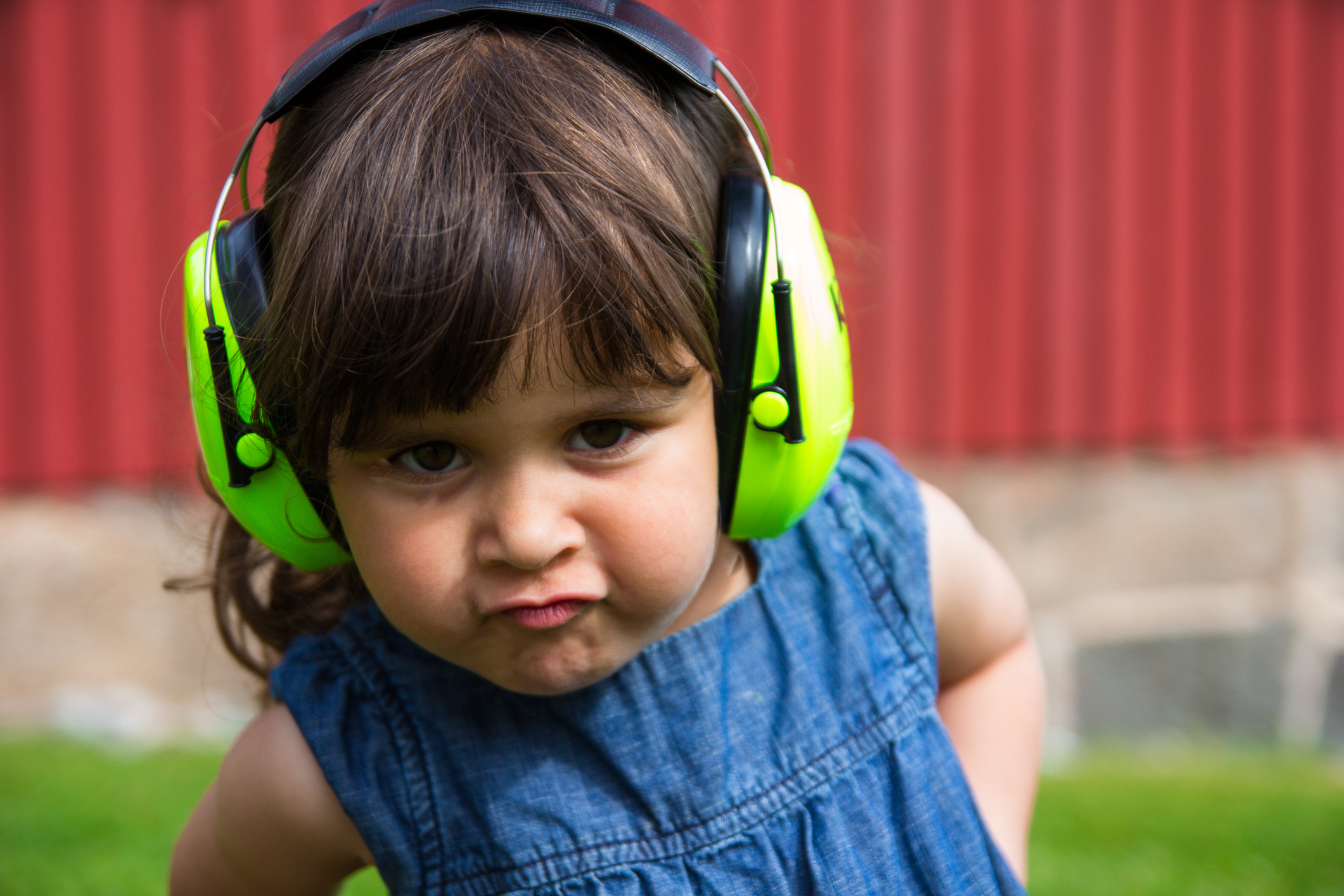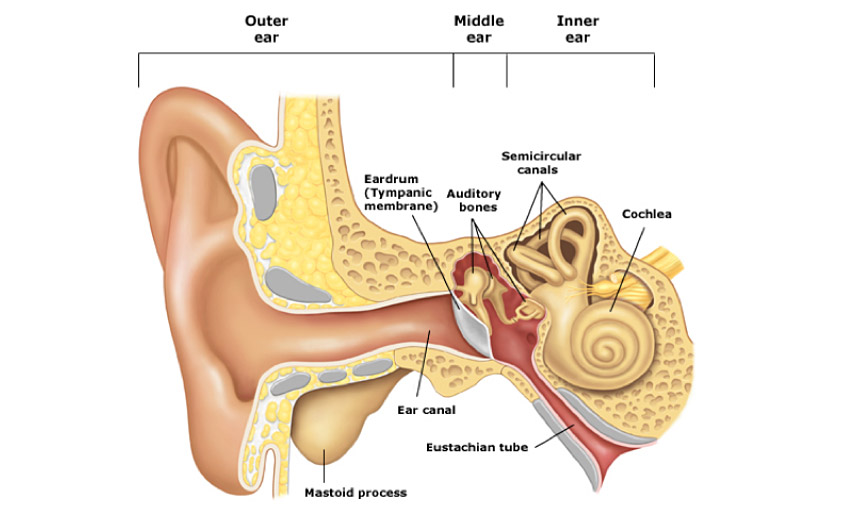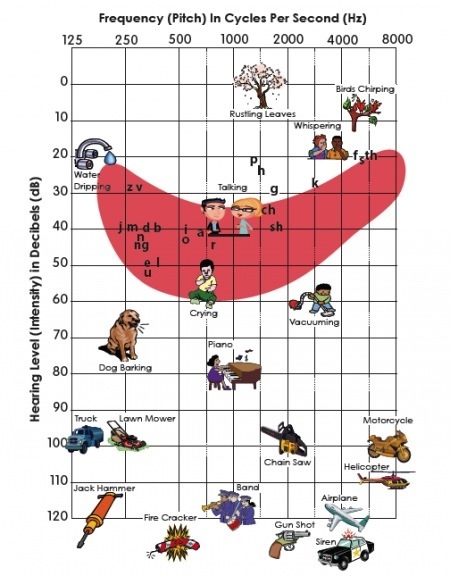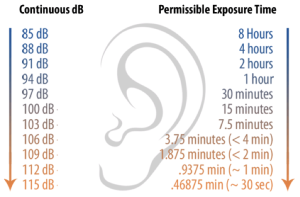Listen up… Turn it to the left
Jan
15
2016

Sensorineural (or permanent) hearing loss can be caused from many factors including: age, genetics, medications (like chemotherapy), and/or other health issues (such as diabetes), just to name a few.
A very common and often overlooked cause of hearing loss, is noise-induced hearing loss.
Noise-induced hearing loss!?!
Yes, that means it is possible that some noises in and around your environment could cause permanent damage to your hearing. In fact, of the approximately 30 million Americans that have hearing loss, 1 in 3 have developed hearing loss due to exposure to noise. Before we continue with more information about noise induced-hearing loss, let’s back up and talk about how the hearing process works.
Sound is funneled into the ear canal from the Pinna (outer ear) and travels down the ear canal to the eardrum.
When sound hit the eardrum it is turned into vibrations and those vibrations move the three ossicles, which are the tiniest bones in the body (the malleus, incus, and stapes). The moving vibrations continue to where they then push on the inner ear (the oval window of cochlea, to be exact), moving the fluid inside. This fluid movement inside the organ of hearing moves the hair cells, which trigger a neural pulse that travels to your brain and tells your brain you have heard something.
With exposure to noise and loud sounds, those hair cells, that are vital to our hearing system, begin to break down. In turn, sounds need to be louder to get those damaged hair cells to fire the neural pulse that travels up to the brain. This is hearing loss!
The Human ear can hear pitches of sound from as low as 20 Hz to as high as 20,000 Hz. The range of normal hearing is anything at 25 dB or softer in terms of volume. Generally, 0 dB is regarded as the threshold of hearing. Sounds in our environment vary in pitch and in loudness. Take a look at the audiogram below to get an idea of where some of our familiar sounds fall on the scale of pitch and loudness. (The letters show us where each letter of the alphabet falls on an audiogram) :
Here’s another way of viewing a loudness scale of sounds in our environment:
Keep in mind the average conversational speech takes place at about 60 decibels. Once sounds become as loud as 85 dB, they can cause permanent damage to your hearing. The louder the sound becomes, the quicker damage to our ears can occur. Take a look at these standards set by NIOSH and the CDC in 2002. The quick rule: for every additional 3 dB over 85 dB, subtract half the time before damage can occur.
Concerned for damage to your hearing from noise?
It may be time to visit the Centers For Hearing Care office nearest you for a diagnostic hearing evaluation if:
You have recently been around loud or harmful noises
Your hearing seems muffled after exposure to noise
You are currently experiencing tinnitus (ringing in the ears)
Now that we have talked about the bad news, the damage,
let’s talk about the good news, PREVENTION!
Noise-induced hearing loss can be prevented and here is how:
Protect yourself from harmful sounds! A harmful sound is one that is too loud and lasts too long OR is very loud and sudden. Some examples of harmful sounds are:
Lawn mowers
MP3 players and iPods at full volume
Concerts
Car races
Sporting events
Jet engines
Gunshots
Fireworks
Wearing hearing protection while you are around harmful sounds helps prevent noise-induced hearing loss. Some examples of hearing protection are:
Turning down the volume when listening to TV, music, etc. through headphones or ear buds
Simply walking away from the noise and getting yourself out of that environment
Foam ear plugs (can be found at sporting goods store, CVS/Walgreens)
Ear muffs (can be purchased at hardware store, sporting goods store, etc.)
Custom made ear plugs (can be made by and purchased at your nearest CFHC office). Everyday wear especially for Musicians, Hunters and Shooters, Industrial Workers, and Police/Military.
So, do you still have the urge to blast your music?!?
Think of this song before you do!…
https://www.youtube.com/watch?v=kLSYq5kau_w
Want more information?
Check out these great websites that have been great references for this post:
http://www.dangerousdecibels.org/
http://www.turnittotheleft.org/
By:
Lauren L. Thomas, AuD., CCC-A
Doctor of Audiology
Centers for Hearing Care Austintown
Posted in Educational Tagged with: Audiogram, Audiologist, audiologists, audiology, Austintown, Behind the ear hearing aids, Boardman, BTE hearing aids, car races, Centers for Hearing Care, chemotheraphy, Cleveland, Columbiana, Columbiana County, concerts, dangerous decibels, decibels, Dementia, Dementia and Hearing Loss, diabetes, digital aids with Bluetooth technology, Doctor of Audiology, Dr. Sheryl Figliano, ear buds, Ear Muffs, eardrum, exposure lound sounds, Figliano, fireworks, foam ear plugs, gunshots, hard of hearing, harmful noises, hear aids, Hearing Aid, Hearing Aid Center, Hearing Aids, hearing center, hearing devices, hearing doctor, hearing impaired, hearing loss, Hearing Missions Foundation, hearing protection, hearing tests, hearingaids, helping the world hear, Howland, iphone, jet engines, lawn mowers, Liberty, Mahoning County, medications, mp3 players, music streaming, noise induced hearing loss, Northeast Ohio, Ohio, Pepper Pike, pitches of sound, progressive sensorineural hearing loss, ringing in ears, ringing in the ears, Salem, severe sensorineural loss, sporting events, tinnitus, tinnitus treatment, Trumbull County, turn it to the left, turn it to the left song, Youngstown
Dementia and Hearing Loss
Dec
31
2015

There are many common health concerns linked with hearing loss. One of the biggest concerns as we age is dementia. According to a study done by Johns Hopkins University of Medicine, older adults with hearing loss have an increased risk of “dementia, falls, hospitalizations, and diminished physical and mental health overall” (Resnick, S., et al., 2014).
Dr. Frank Lin at Johns Hopkins University of Medicine makes it a point to address treating hearing loss sooner rather than later as it contributes to these other major health concerns (Resnick, S., et al., 2014).
On average, it takes a person 5-7 years after they notice their hearing loss to get hearing aids. Your choice to get hearing aids earlier in life when you need them can have a huge impact on the quality of your life going forward. This includes improving your chances of not having dementia or a cognitive decline. Better hearing also leads to a slower process of brain shrinkage, which is a normal part of aging.
Make the choice today,
while you are still able to do so for yourself.
Choose to hear, choose to live a higher quality of life,
choose to be there for your loved ones!
Resnick, S., et al. (2014). Hearing Loss Linked to Accelerated Brain Tissue Loss. Johns Hopkins Medicine. Available: http://www.hopkinsmedicine.org/news/media/releases/hearing_loss_linked_to_accelerated_brain_tissue_loss_.
Written by: Crystal Lewis
Patient Care Coordinator
Centers For Hearing Care
Crystal is a key member of our patient outreach and operations staff here at Centers for Hearing Care. She holds a strong educational and research background in the sciences and medicine. A graduate of the University of Nebraska with a Master’s of Science in Biology with an emphasis on Anatomy and Physiology. She graduated from Youngstown State University with a Bachelor of Science degree in Biology and Pre-Medicine and a minor in Chemistry, where she did research in a hypertension laboratory. Crystal also spent some time as an undergraduate researcher working in Akron Children’s Hospital Emergency Department.
Posted in Educational Tagged with: Audiologist, audiologists, audiology, Austintown, Behind the ear hearing aids, Boardman, BTE hearing aids, Centers for Hearing Care, Cleveland, Columbiana, Columbiana County, Dementia, Dementia and Hearing Loss, digital aids with Bluetooth technology, Doctor of Audiology, Dr. Frank Lin, Dr. Sheryl Figliano, Figliano, hard of hearing, hear aids, Hearing Aid, Hearing Aid Center, Hearing Aids, hearing center, hearing devices, hearing doctor, hearing impaired, hearing loss, Hearing Loss Linked to Accelerated Brain Tissue Loss, Hearing loss personal story, Hearing Missions Foundation, hearing tests, hearingaids, helping the world hear, Howland, iphone, Johns Hopkins Medicine, Liberty, Mahoning County, music streaming, Northeast Ohio, Ohio, Pepper Pike, progressive sensorineural hearing loss, Rebecca Donchess, Resnick, ringing in ears, ringing in the ears, Salem, severe sensorineural loss, tinnitus, tinnitus treatment, Trumbull County, Youngstown







